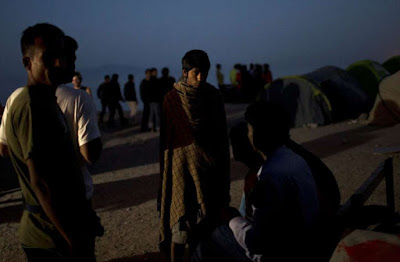All of Europe was looking for Abdelhamid Abaaoud, the planner of the Paris attacks, when two women approached his roadside hiding place, guided by the voice of someone secretly watching from a distance and giving directions by phone.
“Go forward. Walk. Stop,” the voice said. “He can see you. He’s coming.”
It was 9:30 p.m., two days after the bombings and shootings in November that left 130 people dead. France had closed its borders and launched a massive manhunt. But Abaaoud emerged from behind a bush and strolled toward the women as if there were nothing unusual about this rendezvous.
One of the women, Abaaoud’s cousin, jumped into his arms, saying, “Hamid, you’re alive!”
But her companion, who had come without knowing who they were to meet, felt a shudder of recognition. “I’d seen him on TV,” she later told police, referring to videos from Syria that showed Abaaoud dragging dead bodies behind a truck.
The meeting, which is described in French investigative files obtained by The Washington Post, set in motion a three-day sequence that culminated in a raid on an apartment in Saint-Denis, north of Paris. Abaaoud, 28, was killed in that operation by authorities who subsequently learned that he was plotting additional attacks.
His plans were derailed largely because of his decision to involve two women whose impulses when faced with the choice of trying to help him or stop him were immediately at odds.
His cousin, a troubled, 26-year-old woman named Hasna Ait Boulahcen, helped Abaaoud elude authorities for days and died with him in the Saint-Denis apartment, where one of the cornered militants detonated a suicide bomb.
The other woman, who had served as a surrogate mother to Ait Boulahcen for several years, secretly called and met with police, providing information that probably helped authorities stave off another wave of attacks.
The relationship between the two women in many ways reflects broader tensions in Muslim communities across Europe over interpretations of their religion, degrees of loyalty to their countries and the insidious appeal of the Islamic State.
In a Nov. 18 news conference, François Molins, the Paris prosecutor, said that a key witness helped identify Abaaoud on French territory and that investigators “were led to this apartment” by that crucial source. French police declined to elaborate or comment further on the case.
But until now, the public has been unaware that the critical tip in the hunt for Abaaoud came from a Muslim — one of millions who now face a backlash in Europe fueled by anger over the attacks in Paris and Brussels, as well as fear and resentment of a rising tide of refugees.
“It’s important the world knows that I am Muslim myself,” the woman said, citing that as a reason for being willing to speak to The Post. “It’s important to me that people know what Abaaoud and the others did is not what Islam is teaching.”
The case also provides insights into the Islamic State’s haphazard approach to exporting terror. Abaaoud taunted Western security agencies about his ability to move between Syria and Europe for two years without getting caught. He led the planning of a multistage attack, using cellphones to coordinate the strikes and to make sure that his subordinates followed through. He is believed to have fired his own weapon into packed Paris restaurants before taking the subway to witness the carnage at the Bataclan theater.
But for all of his preparations, he appears to have had no plan for the aftermath and no misgivings about pulling family members into his violent wake. After hiding among roadside shrubs, he enlisted Ait Boulahcen, long enamored of him, to help procure food, clothes and a better place to plot his next move.
This account is drawn from dozens of French investigative documents obtained by The Post. The surviving woman, in her 40s, discussed her involvement in the case but asked not to be identified, citing concern for her safety as security officials across Europe continue searching for Islamic State operatives.
Abaaoud told the women that dozens of Islamic State militants had accompanied him into Europe by hiding among streams of refugees. Another of his accomplices in the Paris attacks, Abrini, was arrested by authorities in Belgium on Friday.
The attacks in Brussels last month were carried out by remnants of a network assembled by Abaaoud. A Belgium native, he is believed to have been a key figure in the Islamic State’s external operations branch, recruiting and grooming new arrivals in Syria for attacks against the West.
From cocaine to the niqab
Abaaoud and Ait Boulahcen came from similarly checkered backgrounds. By his late teens, Abaaoud had been expelled from a prestigious school, become involved in neighborhood gangs and convicted of a series of small-time crimes.
Ait Boulahcen spent much of her childhood in a foster home that provided an escape from an abusive mother and absent father, according to the French files. Her brief adulthood was marked by binges on drugs and alcohol, offset by halting attempts to adhere to strict interpretations of her Muslim faith.
“She lived with me from 2011 to 2014, on and off,” the woman who sheltered Ait Boulahcen said in an interview. “She would run away for two weeks, come back a month, over and over again. She took a lot of drugs, mostly cocaine, and drank too much.”
But Ait Boulahcen could also be endearing. She helped with chores, expressed heartfelt gratitude to her adopted family and entertained them with stories about her Paris night life. “She would always make us laugh,” the friend said.
In 2014, Ait Boulahcen’s turbulent life appeared to take a new turn. She began expressing more strident views about religion and took to wearing a niqab — a garment worn by Muslim women to cover all but their eyes.
She also began “chatting with someone in Syria” using the smartphone application WhatsApp, according to transcripts of the friend’s interview with French counterterrorism investigators. Ait Boulahcen didn’t reveal the identity of her correspondent to her friend, but her affection for her cousin and the timing of his trips to Syria make it likely that the messaging exchanges were with Abaaoud.
The two — whose mothers are sisters — grew up in separate cities but appear to have shared a romantic attachment. Ait Boulahcen told friends at times that she expected one day to marry Abaaoud, who was two years older, although it’s not clear that the prospect of such a marriage ever moved beyond daydream status.
Abaaoud made his first trip to Syria in 2013 along with six other militants from Belgium, part of a wave of thousands of foreign fighters who left Europe to fight alongside al-Qaeda or the Islamic State.
Abaaoud had no special military skill but was propelled up the Islamic State’s ranks by a brash personality and sadistic streak that seemed perfectly suited to the ultra-violent and image-obsessed militant group.
In March 2014, Abaaoud posted a video on Facebook that showed him on the front lines of a battle in Syria, saying, “It gives me pleasure from time to time to see blood of the disbelievers run.”
Weeks later, a more disturbing video surfaced that caught the attention of French authorities. It showed him driving a truck and dragging mutilated corpses across a dusty field.
“Before, we towed jet skis, motorcycles and trailers filled with gifts,” he said from the truck’s cabin, looking into the camera. “Now, thank God, we are following his path while towing disbelievers who are fighting us.”
Ait Boulahcen reacted with apparent pride when the footage aired on French news, and she searched for the full video online to show it to her surrogate family, telling her older friend that her Belgian cousin was in Syria “waging war.”
“I’m meant to marry him,” she said, according to the files.
Although Ait Boulahcen often talked of planning a trip to Syria, she never went. Instead, she spent four months last year in Morocco, where she said she met another marriage prospect, before returning to France in October and abandoning those wedding plans.
By then, Abaaoud was back into Europe and in the final stages of plotting the Nov. 13 attacks on a Paris stadium, concert hall and crowded restaurants. There is no indication in the documents that he had any contact with his cousin.
After Paris
Ait Boulahcen seemed unfazed by the bloodshed that Friday evening in the fall. Amid mass public mourning, as medical teams were still treating victims and collecting bodies, Ait Boulahcen asked her friend to help straighten her hair so that she could go out.
“They’re all unbelievers,” she said of the victims, her friend recalled. “Nothing can happen to me.”
Her detached manner remained intact until Sunday evening, when Ait Boulahcen and members of her surrogate family returned home after a walk through Saint-Denis. About 8:30 p.m., Ait Boulahcen’s cellphone lit up with an unfamiliar number prefaced by the country code 32, which corresponds to Belgium.
She asked who had given the caller her number. When the caller replied that he was calling on behalf of her cousin, Ait Boulahcen at first scoffed and hung up, only to watch the phone light up again.
“I’m not going to explain everything: You saw what happened on TV,” the caller said, telling her that her cousin needed help finding a place to hide “for no more than a day or two.”
Suddenly, Ait Boulahcen seemed elated. “Tell me what I have to do,” she said, according to the account her friend gave to authorities. “She was happy. She was saying, ‘I hope it’s not a joke!’ ”
Although the importance of that call seems obvious in hindsight, the friend told police that in that moment she and Ait Boulahcen were not sure which relative was reaching out for help. In early 2014, Abaaoud abducted his 13-year-old brother and took him to Syria. Given how much attention Abaaoud attracted among European security services, both women thought it unlikely that he could have entered France and that perhaps it was the younger cousin who needed to be rescued.
That scenario unraveled when Abaaoud stepped out of the bushes and into the dim streetlight. He told Ait Boulahcen that he would give her 5,000 euros to help him find a place to hide and to pay for new suits and shoes for himself and an accomplice who remained hidden and was probably the voice on the phone.
As initial fear gave way to anger, the friend said she began pressing Abaaoud to admit his involvement in the attacks and to explain why he had harmed so many innocent people. Abaaoud seemed not to mind the questions, saying that his religion compelled him to tell the truth.
“He said we were lost sheep and that he wanted to blow us all up,” the friend said in the interview with The Post, which took place last week in France. He said dozens of others from the Islamic State had returned to Europe with him and that the violence Paris had just witnessed “was nothing” compared with what would come next.
The three walked toward the car, where Abaaoud appeared to reach for a weapon when he saw a male figure — the friend’s husband — behind the wheel. After being reassured, Abaaoud then climbed into the rear seat and rode with the group for about 150 yards. Then, abruptly, he changed his mind and asked to be let out.
As the others drove off, Ait Boulahcen’s phone rang again. “You can tell the little couple that if they talk, my brothers will take care of them,” the voice said. When Ait Boulahcen laughed while relaying the threat, the friend’s husband slapped her across the face.
One of Abaaoud’s suspected conspirators in the Paris attacks, Salah Abdeslam, also seems to have had no escape plan on the night of the attacks and sought help from relatives. A cousin he called refused and asked whether he had heard about the attacks and citywide lockdown.
Abdeslam answered, “Oh yeah, attacks, huh?” The cousin then turned her phone off.
When they returned from the roadside meeting, the friend poured glasses of wine for Ait Boulahcen in an attempt “to get her drunk so that she would call the police,” the friend said. But the plan didn’t work, and the others in the house were too frightened to act on their own.
“I was scared because I thought if the terrorist knew I’d come forward, they’d kill me,” she said.
But the next day, when Ait Boulahcen briefly left the house, the friend called an emergency number posted by the French authorities. Although she made the call about 2 p.m., it took more than three hours for her to hear back from France’s counterterrorism squad, the SDAT.
The friend spent much of that Monday evening at the unit’s headquarters providing a detailed account of the encounter with Abaaoud, a conversation detailed in a transcript obtained by The Post. When she returned home, she told Ait Boulahcen that she had been out to dinner and a movie.
For the next 24 hours, the pursuit of Europe’s most wanted terrorism suspect seemed to enter an eerily suspended state. No arrest or high-profile raid followed the friend’s visit to police.
But French security services were quietly mobilizing. The documents indicate that they were already monitoring Ait Boulahcen’s phone and caught her “actively seeking accommodation” for Abaaoud and his accomplice. Vehicles with eavesdropping equipment passed through Saint-Denis, where Ait Boulahcen found a landlord willing to rent an apartment on short notice for 150 euros.
Abaaoud was still at large Tuesday night as Ait Boulahcen left her surrogate family for the final time. She bought the shoes and suits her cousin wanted and indicated that she also needed to deliver 750 euros in cash.
As she departed, “it seemed like she was saying goodbye,” the friend said in the interview. “She told me that she loved me, that I’d been a great mother to her, that I would go to heaven.”
But the friend asked whether she could retrieve Ait Boulahcen later that night, and in a measure of the trust that remained between them, Ait Boulahcen gave an address in Saint-Denis — coordinates the friend then relayed to the police.
As Ait Boulahcen and the two fugitives arrived at the apartment about 10 p.m., they told the landlord they had been tossed out of their home by their mother, asked for water and the direction of Mecca, and said they just wanted “to sleep two or three days.”
Video of the Tuesday raid captured a female voice pleading, “I want to leave” and “Can I come out? Let me out!” before an explosion ripped through the apartment. French authorities initially said that Ait Boulahcen detonated a suicide bomb, but they later abandoned that claim.
Her body had been pierced by a bolt, according to a detailed description of the scene in the French files. But “that does not explain the death,” investigators wrote. Instead, authorities concluded that Ait Boulahcen’s death was “due to mechanical asphyxia chest compression,” meaning she was crushed after the explosion inside the collapsed apartment.
She left a small collection of belongings at her friend’s house, including clothes, handbags and photos. The friend said she and her husband have struggled with guilt and feel responsible for Ait Boulahcen’s death.
The woman was placed in protective custody after the Saint-Denis raid, but she said she worries about her safety. “I no longer feel safe when I walk around,” she said as she made her way toward her car after the interview. Abaaoud “said they had many operatives. . . . It could be anybody around here.”
Virgile Demoustier in Paris and Steven Rich and Julie Tate in Washington contributed to this report.


































